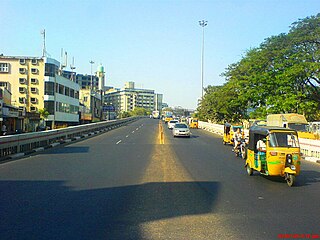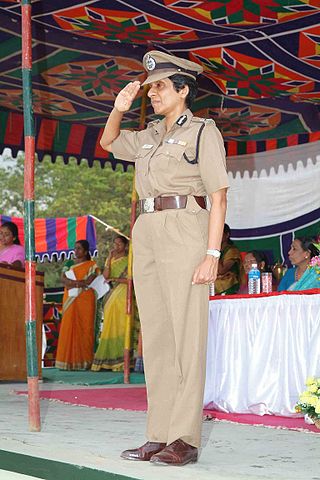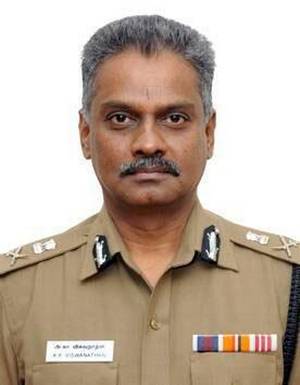
Good Samaritan laws offer legal protection to people who give reasonable assistance to those who are, or whom they believe to be injured, ill, in peril, or otherwise incapacitated. The protection is intended to reduce bystanders' hesitation to assist, for fear of being sued or prosecuted for unintentional injury or wrongful death. An example of such a law in common-law areas of Canada: a Good Samaritan doctrine is a legal principle that prevents a rescuer who has voluntarily helped a victim in distress from being successfully sued for wrongdoing. Its purpose is to keep people from being reluctant to help a stranger in need for fear of legal repercussions should they make some mistake in treatment. By contrast, a duty to rescue law requires people to offer assistance and holds those who fail to do so liable.

Muthuvel Karunanidhi Stalin is an Indian politician serving as the 8th and current Chief Minister of Tamil Nadu since 2021. The son of the former Chief Minister M. Karunanidhi, Stalin has been the president of the Dravida Munnetra Kazhagam (DMK) party since 28 August 2018. He served as the 45th Mayor of Chennai from 1996 to 2002 and the 1st Deputy Chief Minister of Tamil Nadu from 2009 to 2011. Stalin was placed 24th on the list of India's Most Powerful Personalities in 2022 by The Indian Express.

The Metropolitan Transport Corporation (Chennai) Ltd. - (MTC), is the agency that operates the public bus service in Chennai, India. It is a subsidiary of Tamil Nadu State Transport Corporation Ltd. As of December 2022 the MTC had a total fleet of 3,436 buses with 3,233 scheduled services, with on average 2.946 million passengers per day. On March 22, 2016, the Union Ministry of Road Transport and Highways reported that Chennai had the most crowded buses in the country with 1300 passengers per bus in each direction per day. During peak hours, on some routes, a bus with a capacity to accommodate 80 persons carries twice the number of people due to the extensiveness of the system. It has an operating area of 3,929 square kilometres (1,517 sq mi). MTC has a total of 604 routes with its largest terminus being Broadway in Central Chennai.

Tiruvallur (திருவள்ளூர்) is a Grade I municipality in the Indian state of Tamil Nadu. It is located on the banks of Coovum river about 46 km (29 mi) from downtown Chennai (Madras) and just 5 km from megacity border, in the western part of the Chennai Metropolitan Area (CMA). It is a satellite town of Chennai and is the administrative headquarters of Tiruvallur District. The town is known for the Veeraraghava Swamy Temple, one of the 108 sacred shrines of Vaishnavites. The tank festival is held at a pond near this temple. A Shiva temple near this shrine which is popular among the locals. There is also a 40-foot (12 m) tall Viswaroopa Panchamukha Hanuman temple, where the murti is made of a single green granite stone.

Anna Flyover, also known as Gemini Flyover, is a dual-armed grade separator in the central business district of Chennai, India. Built in 1973, it is the first flyover in Chennai and the third in India. It was the longest flyover in the country at its completion. It allows traffic movements on Anna Salai to cross traffic with grade separation. The area and the flyover is named after the now-demolished Gemini Studios.

Letika Saran is the former Director General of Police, Tamil Nadu, India. Earlier she served as the 36th Commissioner of Police in Chennai. She is the only woman to head a metropolitan police organization in India. Before that she was an Additional Director-General of Police (ADGP).

The World Day of Remembrance for Road Traffic Victims takes place on the third Sunday in November every year as the appropriate acknowledgment of victims of road traffic crashes and their families. It was started by the British road crash victim charity, RoadPeace, in 1993 and was adopted by the United Nations General Assembly in 2005.
Tamil Nadu, a state in South India, has a developed, dense, and modern transportation infrastructure, encompassing both public and private transport. Its capital city Chennai is well-connected by land, sea, and air and serves as a major hub for entry into South India.
National Highway 716 is a National Highway in India. It starts from its junction with NH 16 near Chennai in Tamil Nadu and terminates at its junction with NH 40 near Kadapa in Andhra Pradesh.

The Coimbatore Bypass Road refers to a series of bypasses connecting the various National Highways and State Highways passing through and originating in the South Indian city of Coimbatore.

SaveLIFE Foundation (SLF) is an independent, non-profit, non-governmental organization focused on improving road safety and emergency medical care across India. SLF combines evidence-based research with policy advocacy, communication, and on-ground execution of projects in the two areas of crash prevention as well as post-crash response. Over the past few years, SLF has facilitated the enactment of the Good Samaritan Law in India, which insulates lay rescuers of injured victims from ensuing legal and procedural hassles. It has also adopted the Mumbai Pune Expressway to transform it into a Zero Fatality Corridor, trained several thousand Police personnel and citizens in basic life-saving techniques, and built technology platforms to assist road users and those interested in road safety.

Traffic collisions in India are a major source of deaths, injuries and property damage every year. The National Crime Records Bureau (NCRB) 2021 report states that there were 155,622 fatalities, highest since 2014, out of which 69,240 deaths were due to two-wheelers. A study by Insurance Institute for Highway Safety, U.S. shows that the use of seat belts significantly reduces the risks and injuries from road accidents, and yet there is no enforcement on use of seat belts in cars. A study by IIT Delhi points out that the national highways constitute only 2% of the length of roads in India, but they account for 30.3% of total road accidents and 36% of deaths.

Madurai in Tamil Nadu, India, has well-developed transport facilities. Modes of transport in Madurai include road, rail and air. Madurai faces increasing daily traffic problems, so master plans have been prepared to reduce the city traffic and traffic problems in suburbs.
Road collisions in Tamil Nadu, a state in South India, are among the highest in India. In 2013, the state recorded 15,563 fatalities in the 14,504 recorded collisions, the highest for any state in India. The state also topped the list of most collisions in a state for all previous 18 years from 2002 to 2020. According to the report of two experts published in the International Journal of Research in Management and Technology, driving under the influence of alcohol accounts for 82 per cent of collision fatalities in India. A few political leaders have vehemently opposed the state-run TASMAC shops that sell alcohol and have called for a total prohibition of alcohol in the state, but opposing governments have maintained that prohibition would lead to illegal liquor, which in the past has claimed hundred of lives. The increase in number of vehicles from 82 lakh in 2007 to 1.6 crore in 2012 without appreciable change in the road infrastructure is also believed to the reason for most collisions.

National Highway 79 is a National Highway in India entirely within the state of Tamil Nadu. It runs between Ulundurpettai and Salem in the Indian state of Tamil Nadu for a total of 134 km (83 mi). It connects with NH 44 and NH 544 at Salem. NH 79 connects NH 68 and SH 69 at Ulundurpettai and SH 6 at kallakurichi. It was upgraded to a dual carriageway road in two phases on a Build-operate-transfer basis by Reliance Infrastructure and Maytas.

Piyush Tewari is an Indian social entrepreneur, focused on improving road safety, access to emergency medical care and urban governance across India. He is the Founder and CEO of SaveLIFE Foundation, and best known for his work to pass a Good Samaritan Law in India. In 2016, GQ Magazine named him as one of the most influential young Indians. In 2014, Tewari was featured as an expert on Satyamev Jayate, a popular TV show on social issues, hosted by actor Aamir Khan. The episode Tewari was featured in was focused on the epidemic of road accidents in India.

Kuthiran Tunnel is a twin-tube six-lane highway tunnel in the South Indian state of Kerala. The tunnel is located on the National Highway 544 and it is owned and operated by the National Highways Authority of India. This is Kerala's first-ever tunnel for road transport and South India's longest six-lane road tunnel. Construction of the tunnel started in 2016 and completed by December 2021.

Dr. A. K. Viswanathan, IPS, is an Indian Police Service officer of the 1990 batch. He is presently in the rank of Director General of Police and serves as the Managing Director of Tamil Nadu Police Housing Corporation Limited, a wholly owned Company of the Government of Tamil Nadu. TNPHC is engaged in various projects related to police housing and infrastructure. He served as the Commissioner of Police, Greater Chennai, from May 2017 to 1 July 2020.
Organ transplantation in the Indian state of Tamil Nadu is regulated by India's Transplantation of Human Organs Act, 1994 and is facilitated by the Transplant Authority of Tamil Nadu (TRANSTAN) of the Government of Tamil Nadu and several NGOs. Tamil Nadu ranks first in India in deceased organ donation rate at 1.8 per million population, which is seven times higher than the national average.
Organ donation in India is regulated by the Transplantation of Human Organs and Tissues Act, 1994. The law allows both deceased and living donors to donate their organs. It also identifies brain death as a form of death. The National Organ and Tissue Transplant Organisation (NOTTO) functions as the apex body for activities of relating to procurement, allotment and distribution of organs in the country.
















